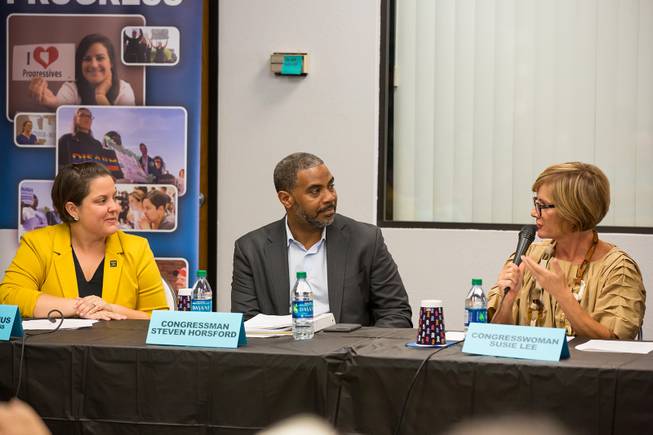
From left, Annette Magnus of Battle Born Progress, Congressman Steven Horsford and Congresswoman Susie Lee attend a roundtable panel on the rising cost of prescription drugs in the U.S. Tuesday Aug. 20, 2019.
Wednesday, Aug. 21, 2019 | 5:45 a.m.
Thirteen-year-old Joey Ward’s asthma attacks are so severe that he often has to leave school when he is suffering an attack.
The cost of the prescription drugs he has taken for years to control his asthma continues to rise, so much so that his mother sometimes has to ask for help to pay for his medication.
“My mom is trying really hard,” he said. “It makes me sad I need this medicine to breathe. I need it to live.”
Ward’s was just one of the stories about soaring prescription costs told Tuesday afternoon in Las Vegas during a roundtable discussion led by U.S. Reps. Steven Horsford and Susie Lee.
The two Democrats, whose districts include parts of Southern Nevada, say rising prescription drug costs can be traced to a number of factors, including a lack of pricing transparency, market exclusivity for drug creators and pharmaceutical industry influence in politics.
Annette Magnus, the executive director of progressive group Battle Born Progress, which hosted the roundtable, introduced Horsford and Lee, along with state Sen. Yvanna Cancela, D-Las Vegas, saying that prescription drug pricing was a problem that affected communities across the board.
“These things have an impact on our lives every single day, whether it’s our children, whether it’s the people here at this table or the people that Planned Parenthood sees every day,” she said. “Those things matter to everyday individuals’ lives.”
Lee said that 1 in 3 Americans last year didn’t fill their prescriptions because of cost. Decisions like these — to take different medications or to take less medication than prescribed — can land people in even more expensive emergency care, Lee said after the event.
The issue, Lee said, is one in which she hopes can gain bipartisan consensus in a political climate where that is more and more difficult.
“There’s not many issues in this country where I think we can come together, but I do think that prescription drug pricing — it doesn’t matter if you’re a Democrat, a Republican, an Independent, it doesn’t matter if you live in rural Iowa or you live in Los Angeles — this is an issue that affects every single American and one that we in Congress need to come together to address,” Lee said.
Lee touted passage of the For the People Act, which she called probably the most important piece of legislation that has cleared the House this year. The act would require political organizations that dole out money to candidates to make their donors public. These dark money donations, she said, are one of the tools in the drug lobby’s arsenal.
“I’m part of a historic freshman class,” Lee said. “We got elected on an agenda of cleaning corruption out of Washington, of bringing government back for the people, and (the act) does that by getting rid of dark money — the dark money that pharmaceutical companies (have) used to control Congress for so long.”
The For the People Act, however, has hit a roadblock in the Senate, with Senate Majority Leader Mitch McConnell, R-Kentucky, keeping it and many other Democratic-backed bills from the House from being debated in the upper chamber.
Horsford, who had heart surgery in 2013 and said he likely would be on medication for the rest of his life, has made prescription affordability one of his main issues. He recently told the Sun he was “laser-focused” on the topic.
Horsford recently introduced the Stopping the Pharmaceutical Industry from Keeping Drugs Expensive Act — SPIKE Act — with Rep. Tom Reed, R-N.Y., as a co-sponsor. The act would require drug companies to justify large price increases to the secretary of health and human services. If a drug increases in price by more than 10 percent, or $10,000, over one year, if a drug increases in price 25 percent, or $25,000, over three years or if a drug has a launch price higher than $26,000, then the price must be justified.
“Until we can get the transparency of cost, it’s hard to then write legislation to hold them accountable on the oversight and enforcement side,” he said.
Horsford also said House Democrats were working to allow the federal government to negotiate directly with drug manufacturers the price it pays for prescription drugs used by Medicare patients.
“It’s asinine that that provision is even in federal law,” he said. “It was passed in the ‘80s when they did Medicare Part D and it literally it is just a phrase in a federal law that prohibits Medicare from being able to directly negotiation with drug companies, and we all know that that’s how costs are set for private plans, for Medicaid, employer-sponsored plans.”
Cancela, who has worked in the past on state bills aimed at tackling high drug costs and whose work was applauded by progressives at the event, was blunt when asked what was needed to ensure work on prescription affordability could continue: elect Democrats.
“If you don’t send people like Congresswoman Lee, Congressman Horsford, Congresswoman (Dina) Titus back to make sure that they’re in office after the 2020 election, you’re doing yourself a disservice,” she said.

